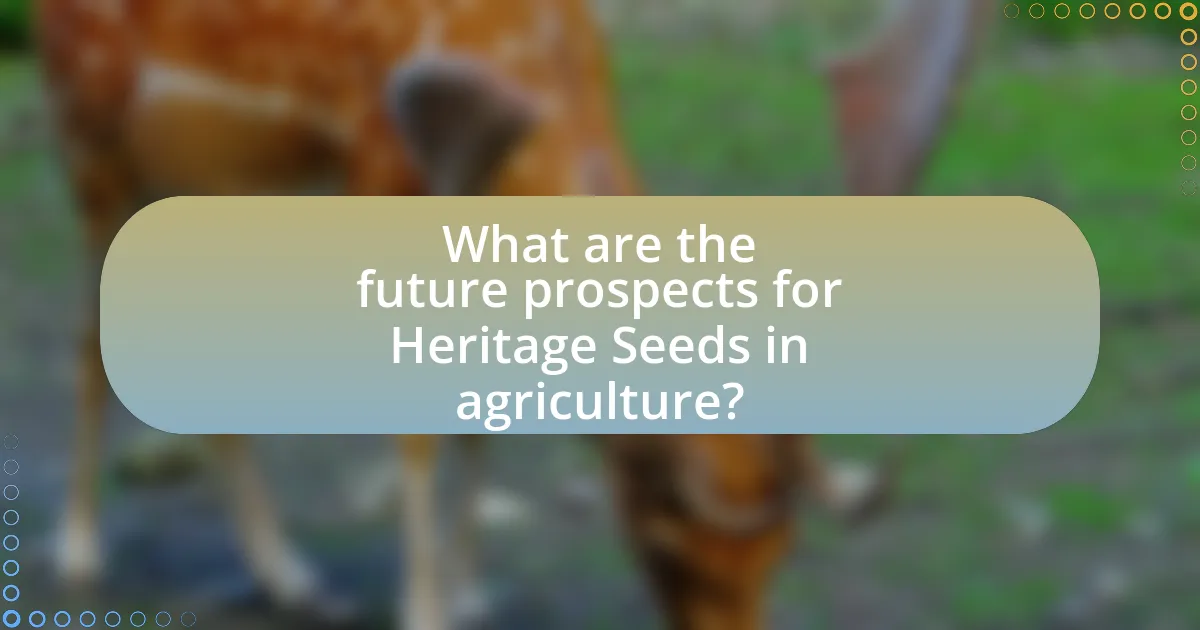Heritage seeds are traditional, open-pollinated varieties that have been passed down through generations, playing a vital role in preserving agricultural biodiversity. This article explores the significance of heritage seeds in enhancing food security, promoting sustainable farming practices, and adapting to climate change. It contrasts heritage seeds with hybrid and GMO seeds, highlighting their unique characteristics and ecological benefits. Additionally, the article discusses the challenges farmers face when using heritage seeds, the economic advantages they offer, and the policies and innovations that can support their cultivation and preservation. Overall, heritage seeds are essential for maintaining genetic diversity and resilience in agricultural systems.

What are Heritage Seeds and Their Importance in Agriculture?
Heritage seeds are traditional varieties of seeds that have been passed down through generations, often characterized by their adaptability, resilience, and unique flavors. Their importance in agriculture lies in their role in preserving biodiversity, as they contribute to a diverse gene pool that can enhance food security and resilience against pests and diseases. According to the Food and Agriculture Organization (FAO), heritage seeds help maintain agricultural diversity, which is crucial for sustainable farming practices and adapting to climate change. By cultivating heritage seeds, farmers can promote ecological balance and ensure the availability of a wide range of crops for future generations.
How do Heritage Seeds differ from Hybrid and GMO Seeds?
Heritage seeds differ from hybrid and GMO seeds primarily in their genetic makeup and cultivation methods. Heritage seeds are open-pollinated varieties that have been passed down through generations, maintaining genetic diversity and adaptability to local conditions. In contrast, hybrid seeds are created through controlled cross-pollination to produce specific traits, often resulting in reduced genetic diversity. GMO seeds, or genetically modified organisms, involve direct manipulation of an organism’s DNA in a laboratory to introduce specific traits, which can lead to unforeseen ecological impacts. Heritage seeds promote biodiversity by preserving traditional varieties that are well-suited to local environments, whereas hybrid and GMO seeds often prioritize uniformity and specific agricultural outcomes.
What characteristics define Heritage Seeds?
Heritage seeds are defined by their open-pollinated nature, which allows them to be naturally pollinated and produce seeds that can be replanted with the same characteristics as the parent plant. These seeds are typically heirloom varieties, meaning they have been passed down through generations, often for at least 50 years, and are valued for their genetic diversity, adaptability to local conditions, and unique flavors. Heritage seeds contribute to agricultural biodiversity by preserving traditional varieties that may be better suited to specific climates and soils, thus supporting sustainable farming practices.
Why are Heritage Seeds considered more sustainable?
Heritage seeds are considered more sustainable because they promote biodiversity and are adapted to local growing conditions. These seeds have been passed down through generations, allowing them to develop resilience to local pests and diseases, which reduces the need for chemical inputs. Additionally, heritage seeds contribute to the preservation of genetic diversity in crops, which is essential for food security and ecosystem stability. Studies show that diverse agricultural systems are more resilient to climate change and environmental stressors, further supporting the sustainability of heritage seeds.
What role do Heritage Seeds play in preserving biodiversity?
Heritage seeds play a crucial role in preserving biodiversity by maintaining genetic diversity within crop species. These seeds are traditional varieties that have been passed down through generations, often adapted to local climates and conditions, which enhances resilience against pests, diseases, and climate change. Research indicates that heritage seeds contribute to the conservation of unique traits and characteristics that modern commercial varieties may lack, thus safeguarding a wider range of genetic resources. For instance, the Seed Savers Exchange reports that heritage seeds help sustain over 25,000 varieties of fruits and vegetables, ensuring a diverse gene pool that is vital for food security and ecological balance.
How do Heritage Seeds contribute to genetic diversity in crops?
Heritage seeds contribute to genetic diversity in crops by preserving a wide range of genetic traits that have evolved over time. These seeds represent traditional varieties that have adapted to local environments, which enhances resilience against pests, diseases, and climate variability. Research indicates that heritage seeds can contain unique genetic markers that are not found in modern hybrid varieties, thereby increasing the overall genetic pool available for breeding programs. For example, a study published in the journal “Agricultural Systems” highlights that utilizing heritage seeds can improve crop adaptability and yield stability, demonstrating their critical role in maintaining agricultural biodiversity.
What ecosystems benefit from the use of Heritage Seeds?
Heritage seeds benefit agroecosystems, particularly those focused on sustainable agriculture and biodiversity conservation. These seeds promote genetic diversity, which enhances ecosystem resilience and adaptability to changing environmental conditions. Research indicates that heritage seeds can improve soil health, support pollinator populations, and contribute to pest management, thereby fostering a balanced ecosystem. For instance, studies have shown that diverse crop varieties can lead to increased yields and reduced reliance on chemical inputs, demonstrating their positive impact on agricultural ecosystems.
Why is biodiversity crucial for agricultural practices?
Biodiversity is crucial for agricultural practices because it enhances ecosystem resilience, improves crop yields, and supports pest and disease management. Diverse plant species contribute to soil health and nutrient cycling, which are essential for sustainable agriculture. For instance, a study published in the journal “Nature” found that farms with higher plant diversity had 20% greater yields compared to monoculture systems. Additionally, biodiversity helps maintain genetic variation, which is vital for breeding programs aimed at developing crops that can withstand climate change and pests. This genetic diversity is often preserved through heritage seeds, which embody a wide range of traits that can be beneficial for future agricultural challenges.
How does biodiversity impact food security?
Biodiversity significantly impacts food security by enhancing ecosystem resilience, which is crucial for sustainable agricultural production. Diverse ecosystems provide a variety of crops and livestock, which can adapt to changing environmental conditions, pests, and diseases. For instance, a study by the Food and Agriculture Organization (FAO) indicates that agricultural biodiversity can increase crop yields by up to 20% in diverse farming systems compared to monocultures. This diversity ensures a stable food supply, reduces the risk of crop failure, and supports nutritional variety, ultimately contributing to improved food security.
What are the ecological benefits of maintaining biodiversity in agriculture?
Maintaining biodiversity in agriculture provides essential ecological benefits, including enhanced ecosystem resilience, improved soil health, and increased pest control. Diverse agricultural systems can better withstand environmental stresses such as climate change and disease outbreaks, as they offer a wider range of genetic resources that can adapt to changing conditions. For instance, studies have shown that farms with higher biodiversity levels experience reduced crop losses due to pests and diseases, as natural predators thrive in these environments, effectively managing pest populations. Additionally, diverse plant species contribute to soil fertility and structure, promoting nutrient cycling and reducing erosion. Research indicates that polycultures, which incorporate multiple species, can yield higher overall productivity compared to monocultures, demonstrating the ecological advantages of biodiversity in agricultural practices.
How can farmers incorporate Heritage Seeds into their practices?
Farmers can incorporate Heritage Seeds into their practices by selecting and planting these seeds to promote biodiversity and resilience in their crops. By choosing Heritage Seeds, which are often open-pollinated and adapted to local conditions, farmers can enhance soil health and reduce dependency on chemical inputs. Research indicates that using Heritage Seeds can lead to increased genetic diversity, which is crucial for adapting to climate change and pest pressures. For example, a study published in the journal “Agriculture, Ecosystems & Environment” highlights that farms utilizing diverse seed varieties, including Heritage Seeds, show improved ecosystem services and crop yields.
What challenges do farmers face when using Heritage Seeds?
Farmers face several challenges when using Heritage Seeds, primarily related to lower yields and susceptibility to pests and diseases. Heritage Seeds often produce less than hybrid varieties, which can lead to economic pressures for farmers who rely on high productivity. Additionally, these seeds may lack the genetic diversity found in modern hybrids, making crops more vulnerable to specific pests and diseases, as evidenced by studies showing increased crop loss in heritage varieties under pest pressure. Furthermore, farmers may encounter difficulties in sourcing these seeds due to limited availability and the need for specialized knowledge in cultivation practices, which can hinder their successful implementation in modern agricultural systems.

What are the benefits of using Heritage Seeds in modern agriculture?
Heritage seeds offer significant benefits in modern agriculture, primarily by enhancing biodiversity and promoting sustainable farming practices. These seeds are often more resilient to pests and diseases due to their genetic diversity, which can lead to reduced reliance on chemical pesticides. Additionally, heritage seeds are adapted to local climates and soils, improving crop yields and food security in specific regions. Research indicates that using heritage seeds can also contribute to the preservation of traditional farming methods and cultural heritage, as they are often passed down through generations. This preservation of genetic diversity is crucial for adapting to climate change and ensuring the long-term viability of agricultural systems.
How do Heritage Seeds enhance soil health?
Heritage seeds enhance soil health by promoting biodiversity and improving soil structure. These seeds are often adapted to local conditions, which allows for a diverse range of crops that can contribute to a balanced ecosystem. The cultivation of heritage seeds encourages the presence of various microorganisms and beneficial insects, which are essential for nutrient cycling and soil fertility. Research indicates that diverse cropping systems, including those using heritage seeds, can lead to improved soil organic matter and reduced erosion, thereby enhancing overall soil health.
What practices can improve soil health through Heritage Seed cultivation?
Practices that can improve soil health through Heritage Seed cultivation include crop rotation, cover cropping, and organic amendments. Crop rotation with diverse heritage varieties enhances soil structure and nutrient cycling, reducing pest and disease pressure. Cover cropping with heritage seeds, such as legumes, adds organic matter and improves soil fertility by fixing nitrogen. Additionally, incorporating organic amendments like compost or manure from heritage seed systems enriches soil microbial activity and enhances nutrient availability. These practices collectively contribute to sustainable soil health and biodiversity preservation in agricultural systems.
How do Heritage Seeds affect pest and disease resistance?
Heritage seeds enhance pest and disease resistance by promoting genetic diversity within crops. This genetic variation allows plants to adapt to local pests and diseases more effectively than monoculture varieties. Studies have shown that heritage varieties often possess unique traits that confer resistance to specific pests and diseases, reducing the need for chemical interventions. For instance, research published in the journal “Agricultural Systems” indicates that diverse cropping systems, which include heritage seeds, can lead to lower pest populations and improved plant health, thereby supporting sustainable agricultural practices.
What economic advantages do Heritage Seeds offer to farmers?
Heritage seeds offer economic advantages to farmers by providing lower seed costs and increased resilience to pests and diseases. Farmers can save money by using seeds from their own harvests, as heritage seeds are often open-pollinated, allowing for seed saving without the need for purchasing new seeds each season. Additionally, heritage varieties tend to be more adaptable to local growing conditions, which can lead to reduced reliance on chemical inputs and improved yields. Research indicates that heritage crops can enhance soil health and biodiversity, further contributing to sustainable farming practices and long-term economic viability.
How can Heritage Seeds reduce dependency on chemical inputs?
Heritage seeds can reduce dependency on chemical inputs by promoting biodiversity and enhancing soil health. These seeds are often adapted to local conditions, making them more resilient to pests and diseases, which decreases the need for chemical pesticides. Research indicates that diverse crop rotations using heritage seeds can improve soil structure and fertility, leading to reduced reliance on synthetic fertilizers. For example, a study published in the journal “Agriculture, Ecosystems & Environment” found that farms utilizing heritage varieties showed a 30% reduction in chemical fertilizer use compared to conventional monoculture systems. This evidence supports the effectiveness of heritage seeds in fostering sustainable agricultural practices.
What market opportunities exist for Heritage Seed growers?
Heritage seed growers have significant market opportunities in niche markets focused on organic and sustainable agriculture. The increasing consumer demand for non-GMO, heirloom varieties drives interest in heritage seeds, as these seeds often offer unique flavors and nutritional benefits. According to a report by the Organic Trade Association, organic food sales reached $62 billion in 2020, indicating a growing market for products that utilize heritage seeds. Additionally, heritage seeds can be marketed to local farmers’ markets and community-supported agriculture (CSA) programs, which emphasize local sourcing and biodiversity. This trend is supported by the rise in consumer awareness regarding food origins and sustainability practices.
How do Heritage Seeds support local communities and cultures?
Heritage seeds support local communities and cultures by preserving traditional agricultural practices and enhancing food sovereignty. These seeds are often adapted to local climates and soils, which allows communities to cultivate crops that are culturally significant and nutritionally beneficial. For instance, heritage seeds contribute to the maintenance of local biodiversity, as they often include varieties that have been cultivated for generations, reflecting the unique agricultural heritage of a region. This preservation of genetic diversity is crucial for food security and resilience against climate change, as diverse crops can better withstand pests and environmental stresses. Furthermore, the use of heritage seeds fosters community engagement and knowledge sharing, as farmers often collaborate to save and exchange seeds, reinforcing social ties and cultural identity.
What role do Heritage Seeds play in preserving traditional farming practices?
Heritage seeds play a crucial role in preserving traditional farming practices by maintaining genetic diversity and cultural heritage associated with agriculture. These seeds are often passed down through generations, embodying the unique traits and adaptations of local environments, which helps farmers sustain traditional cultivation methods. For example, heritage varieties are typically well-suited to specific climates and soils, allowing farmers to grow crops that are resilient to local pests and diseases. This practice not only supports biodiversity but also reinforces community identity and knowledge related to sustainable farming techniques.
How can Heritage Seeds contribute to local food sovereignty?
Heritage seeds contribute to local food sovereignty by promoting agricultural diversity and enabling communities to cultivate crops that are well-suited to their specific environments. These seeds are often adapted to local climates and soil conditions, which enhances resilience against pests and diseases, thereby reducing dependency on external agricultural inputs. For instance, studies have shown that using heritage seeds can lead to increased crop yields in local conditions, supporting food security and self-sufficiency. Additionally, heritage seeds preserve traditional farming practices and cultural heritage, empowering local farmers to maintain control over their food systems. This control is crucial for fostering sustainable agricultural practices that align with community needs and preferences.

What are the future prospects for Heritage Seeds in agriculture?
The future prospects for Heritage Seeds in agriculture are promising, as they play a crucial role in enhancing biodiversity and resilience in farming systems. Heritage Seeds, which are open-pollinated and often heirloom varieties, contribute to genetic diversity, allowing farmers to adapt to changing climate conditions and pest pressures. Research indicates that diverse crop systems can improve soil health and reduce dependency on chemical inputs, which aligns with sustainable agricultural practices. Furthermore, consumer demand for organic and locally sourced foods is increasing, creating a market for Heritage Seeds that support traditional farming methods and local ecosystems.
How can technology aid in the preservation of Heritage Seeds?
Technology can aid in the preservation of heritage seeds through methods such as seed banking, genetic sequencing, and digital databases. Seed banking allows for the long-term storage of seeds in controlled environments, ensuring their viability for future planting. Genetic sequencing provides insights into the genetic diversity and traits of heritage seeds, enabling better conservation strategies. Digital databases facilitate the documentation and sharing of information about heritage seed varieties, promoting awareness and accessibility among farmers and researchers. These technological advancements support the conservation of biodiversity by safeguarding unique seed varieties that are crucial for sustainable agricultural practices.
What innovations are being developed to support Heritage Seed cultivation?
Innovations being developed to support Heritage Seed cultivation include advanced seed-saving techniques, digital platforms for knowledge sharing, and community-supported agriculture models. Advanced seed-saving techniques, such as controlled pollination and cryopreservation, enhance genetic diversity and ensure the viability of heritage seeds over time. Digital platforms facilitate the exchange of information and resources among farmers, promoting best practices in heritage seed cultivation. Community-supported agriculture models connect consumers directly with heritage seed growers, fostering local food systems and increasing demand for diverse crops. These innovations collectively contribute to the preservation of biodiversity in agricultural practices.
How can data collection improve Heritage Seed conservation efforts?
Data collection can significantly enhance Heritage Seed conservation efforts by providing critical insights into genetic diversity, growth conditions, and seed viability. By systematically gathering data on various heritage seed varieties, researchers can identify which seeds are most resilient to climate change and pests, thereby prioritizing their conservation. For instance, studies have shown that maintaining genetic diversity within seed banks can improve crop resilience, as evidenced by the success of diverse seed varieties in withstanding environmental stressors. Furthermore, data collection facilitates the tracking of seed performance over time, allowing conservationists to make informed decisions about which seeds to propagate and distribute, ultimately supporting biodiversity in agricultural practices.
What policies can support the use of Heritage Seeds?
Policies that can support the use of Heritage Seeds include the establishment of legal frameworks that protect traditional seed varieties, financial incentives for farmers who cultivate heritage seeds, and educational programs promoting their benefits. Legal frameworks, such as seed sovereignty laws, can ensure farmers’ rights to save and exchange seeds, thereby preserving biodiversity. Financial incentives, like grants or subsidies, can encourage farmers to adopt heritage seeds, which often have lower yields but greater resilience. Educational programs can raise awareness about the ecological and cultural significance of heritage seeds, fostering community support and participation in their cultivation.
How can governments incentivize Heritage Seed preservation?
Governments can incentivize Heritage Seed preservation by implementing financial subsidies and grants for farmers who cultivate and maintain these seeds. Such financial support encourages farmers to prioritize Heritage Seeds over commercial varieties, which often dominate the market. For instance, the U.S. Department of Agriculture has programs that provide funding for seed banks and conservation efforts, demonstrating a successful model for incentivizing preservation. Additionally, governments can establish tax breaks for farmers who engage in sustainable practices that include Heritage Seed cultivation, further promoting biodiversity in agricultural practices.
What role do NGOs play in promoting Heritage Seeds?
NGOs play a crucial role in promoting heritage seeds by advocating for their preservation and use in sustainable agriculture. These organizations engage in educational initiatives to raise awareness about the importance of biodiversity and the benefits of heritage seeds, which include resilience to climate change and improved nutrition. For instance, NGOs often conduct workshops and training sessions for farmers, demonstrating traditional farming techniques that utilize heritage seeds, thereby fostering community involvement and knowledge sharing. Additionally, NGOs may collaborate with local governments and agricultural institutions to develop policies that support the conservation of heritage seeds, ensuring their availability for future generations. This multifaceted approach not only helps to maintain genetic diversity in crops but also empowers local communities to sustain their agricultural heritage.
What practical steps can farmers take to adopt Heritage Seeds?
Farmers can adopt Heritage Seeds by sourcing them from reputable seed banks or local agricultural organizations that specialize in heirloom varieties. This ensures access to a diverse range of seeds that are adapted to local conditions and have historical significance. Additionally, farmers should engage in seed saving practices, which involve collecting seeds from their best-performing plants to maintain genetic diversity and resilience. Research indicates that using Heritage Seeds can enhance biodiversity, as these varieties often possess traits that are well-suited to specific environments, thereby contributing to sustainable agricultural practices.





